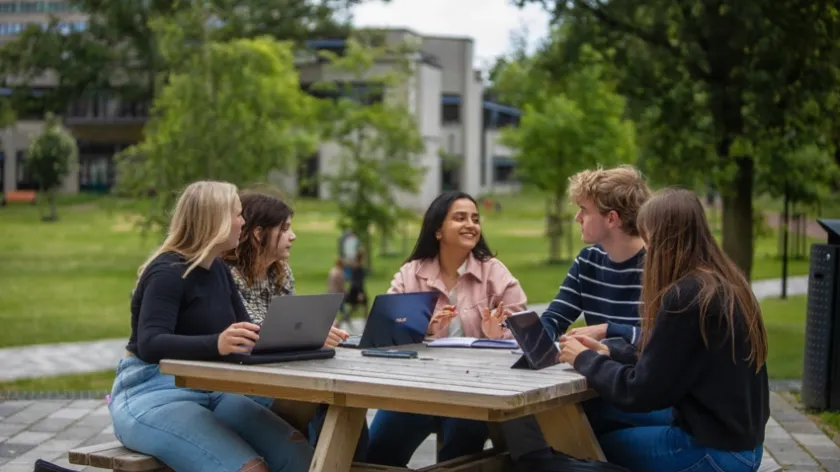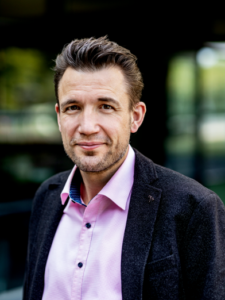New sustainability Master targets both gamma and beta students
-
 Studenten op de campus van de Radboud Universiteit. Foto ter illustratie. Fotograaf: Dick van Aalst
Studenten op de campus van de Radboud Universiteit. Foto ter illustratie. Fotograaf: Dick van Aalst
The new two-year 'Science for Sustainability' Master aims to prepare students for careers as sustainability navigators. The Master is a joint initiative of the management and science faculty. 'Sustainable transitions can only succeed if knowledge from both domains is combined.'
Resource depletion, climate change and biodiversity loss: these are some of the themes at the heart of the new two-year Master in Science for Sustainability.
Starting in September 2025, the study programme is a joint initiative of Nijmegen School of Management (NSM) and Faculty of Natural Sciences, Mathematics and Computing Science (Faculty of Science).
Subjects from both faculties
The Master combines management and science and is designed for students with a broad interest in sustainability. To ensure an equivalent starting level, gamma students must have obtained a minimum of 15 EC in science subjects and vice versa. ‘That way, we make sure everyone is at the same level in the first year,’ says Programme Director Sjors Witjes.
The curriculum consists of courses from both faculties. For example, the Institutional Perspectives course unit focuses on social institutions and policies, while Corporate Strategy deals with business strategies. In Thinking about Sustainability, students learn about the IPCC report and the United Nations Sustainable Development Goals.
For the planetary boundaries theme, the focus lies on insights from the natural sciences such as Biology, Earth Sciences, Chemistry and Physics.
Circularity
An important part of the study programme is the Professional and Personal Development (PPD) line, in which students prepare for their Master’s thesis. ‘Science students can do their thesis within their discipline, as can gamma students, but always with a transdisciplinary approach. The ultimate goal is for the research to actively contribute to sustainability transitions,’ emphasises Witjes.
‘Sustainability and circularity play out internationally’
Although the government wants fewer English study programmes, the new study programme is entirely in English. A logical choice, Witjes believes. ‘Sustainability and circularity play out on an international level. Even small Dutch companies operate within global trade chains.’
Future prospects
An internship is not compulsory in the Master programme, but each thesis must include a practical component. ‘We work with companies in the region for assignments that students have to complete,’ Witjes says. As examples, he cites waste management company DAR, waste-to-energy plant ARN, Royal Smit Transformers, the CWZ and Radboud university medical center.
‘Whether students work in a lab, production space, or boardroom, they can make an impact by integrating research findings in collaboration with professionals in the field. Sustainable transitions can only succeed when academic expertise and practical knowledge come together to drive meaningful societal change.’
The labour market prospects for future alumni are promising, says Witjes. ‘Sustainability navigators are everywhere these days, in both the public and private sectors. In these turbulent times, every organisation needs meaning and direction, whether this comes from an outside adviser or someone from within their own organisation: the future of our alumni is looking bright.
Latest details
The management and science faculties are splitting the costs equally and will share the profits equally if the program succeeds. To be financially viable, the program initially aims for 25 students. ‘Eventually, we hope to attract 30 to 40 students. It doesn’t need to grow much bigger, as that would make it harder to provide proper guidance,’ says Witjes.
The program has successfully passed the New Program Assessment, meaning it has received official approval from The Hague. Leading up to its launch in September 2025, efforts will focus on marketing and student recruitment, including open days.
‘At the last open day, the room filled up twice’
According to the program director, there is certainly no lack of interest in the new master’s program. ‘At the last open day, the room filled up twice, with both Radboud students and visitors from other universities.’
Additionally, the teaching team is being further refined, and the connections between courses are being strengthened. ‘An education expert is reviewing the program structure,’ says Witjes. ‘We’re finalising the last details.’




